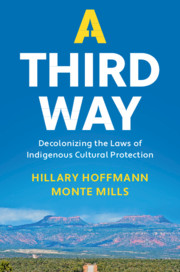Book contents
- A Third Way
- A Third Way
- Copyright page
- Dedication
- Contents
- Figures
- Preface
- Acknowledgments
- Introduction
- 1 Legal History and Foundations
- 2 The Jurisdictional Framework of the Second Way and the Cherokee Diaspora
- 3 Religious Freedom, the Value of Sacred Places, and the Price of Cultural Ignorance
- 4 Clashing Values, the Blackfeet, and a Measure of Success in the Badger-Two Medicine
- 5 Federal Cultural Protection Statutes
- 6 Tribal Laws
- 7 Both Ends of the Spectrum and Everything in Between
- 8 Indigenous Cultures and Intellectual Property
- 9 A Third Way for the Future
- Index
2 - The Jurisdictional Framework of the Second Way and the Cherokee Diaspora
Published online by Cambridge University Press: 16 July 2020
- A Third Way
- A Third Way
- Copyright page
- Dedication
- Contents
- Figures
- Preface
- Acknowledgments
- Introduction
- 1 Legal History and Foundations
- 2 The Jurisdictional Framework of the Second Way and the Cherokee Diaspora
- 3 Religious Freedom, the Value of Sacred Places, and the Price of Cultural Ignorance
- 4 Clashing Values, the Blackfeet, and a Measure of Success in the Badger-Two Medicine
- 5 Federal Cultural Protection Statutes
- 6 Tribal Laws
- 7 Both Ends of the Spectrum and Everything in Between
- 8 Indigenous Cultures and Intellectual Property
- 9 A Third Way for the Future
- Index
Summary
Understanding the laws tribes can use to protect their cultures requires a working knowledge of the jurisdictional framework among the nation’s three sovereigns: the federal government, state governments, and tribal governments. This chapter provides some of the essential elements of this foundation by tracing the arc of US Supreme Court cases in which the justices filled in the contours of the Constitution’s rough outline of the relationship between these three sovereigns. While the Supreme Court’s treatment of tribal authority over this period largely reflected the broader federal interests of a particular era, including the elevation and insulation of exclusive federal authority over Indian affairs in the nineteenth century, Supreme Court decisions of more recent vintage have severely restricted tribal authority, even over areas within the boundaries of present-day reservations, during a period in which the federal government otherwise seemed to embrace a policy of supporting tribal self-government. It is therefore not always possible to discuss individual cases or periods of federal Indian policy in general terms. Moreover, the jurisdictional maze that results from this lengthy history often frustrates attempts to seek legal recognition of inherent tribal authority and confuses even well-versed legal practitioners.
- Type
- Chapter
- Information
- A Third WayDecolonizing the Laws of Indigenous Cultural Protection, pp. 22 - 40Publisher: Cambridge University PressPrint publication year: 2020



